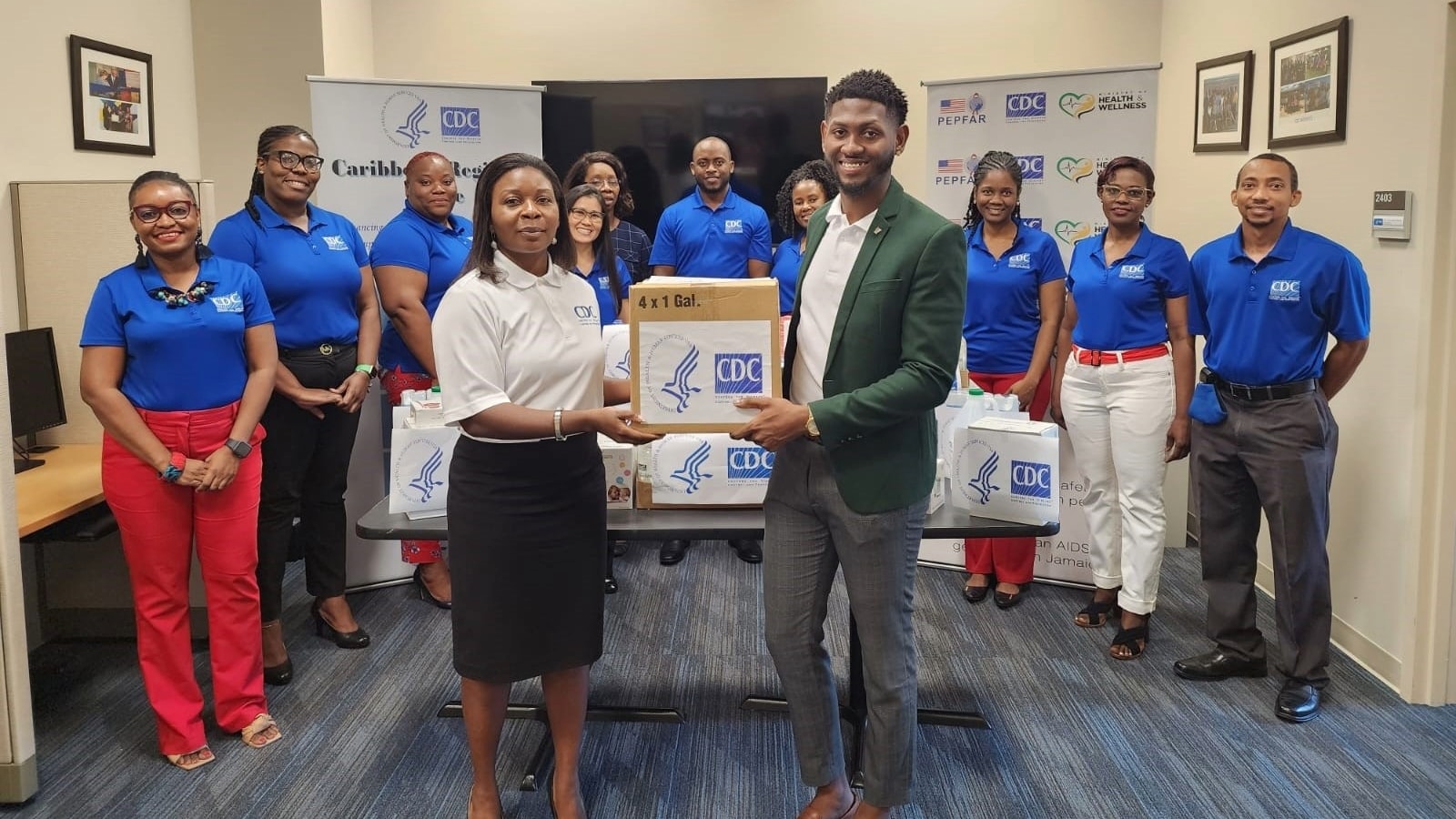At a glance
CDC works with ministries of health and other partners to build effective public health collaboration and partnerships, which strengthen the country's core public health capabilities: data and surveillance, laboratory capacity, workforce and institutions, prevention and response, innovation and research, and policy, communications, and diplomacy.
Overview

CDC established the Caribbean Regional Office 2002 in Trinidad and Tobago. The office moved to Jamaica in 2018. CDC Caribbean works closely with ministries of health, governments, and partner organizations to detect, prevent and control infectious disease outbreaks, and build and strengthen the country’s core public health capabilities. These include data and surveillance, laboratory capacity, workforce and institutions, prevention and response, innovation and research, and policy, communications, and diplomacy.
CDC in the Caribbean also addresses HIV prevention, testing, care, and treatment, strengthening health systems, and supporting immunization efforts.
HIV

Through the U.S. President's Emergency Plan for AIDS Relief (PEPFAR), CDC supports partners in the Caribbean to control the HIV epidemic. CDC efforts include:
- Finding, preventing, and reducing the number of new HIV infections.
- Ensuring all people living with HIV start or resume treatment.
- Tailoring and expanding access to HIV services through differentiated care models and evening clinic hours.
- Integrating care and treatment for HIV and other sexually transmitted infections.
- Supporting activities related to the "Undetectable = Untransmittable" communication campaign.
- Enhancing laboratory testing services for HIV and other diseases.
- Boosting efforts to decrease stigma and discrimination against people with HIV.
Key accomplishments
- In 2023, CDC supported treatment counseling, clinical management, and trauma-informed care trainings for more than 300 healthcare workers.
- CDC helped implement Jamaica's first national household survey on violence against children in 2022.
- As of 2021, CDC supported approximately 13,800 people with HIV in Jamaica and 7,200 people in Trinidad and Tobago to continue treatment.
- CDC helped expand HIV services to include four extra evening hours per day at six clinics.
Global health security
CDC's global health security work in the Caribbean focuses on strengthening countries' public health systems across the following core areas:
Health information systems
CDC and partners strengthen health information and surveillance systems by enhancing interoperability. This work involves linking separate systems and developing data repositories to have data in one place. CDC also helps standardize data collection tools and processes through digitization, visualization, and job aids. These efforts increase availability of high-quality data for program and policy decisions.
Laboratory systems
CDC strengthens laboratory operations through continuous quality improvement activities to allow more laboratories to be internationally accredited. Activities include:
- Training and mentoring laboratory managers.
- Improving the quality of laboratory services, like sample collection, testing, and transportation.
- Achieving rapid results and timely reporting.

Workforce development
CDC helped establish the FETP in the Caribbean Region in 2014. FETP increases the workforce's abilities to prevent, detect, and respond to existing and emerging health threats.
Emergency management
CDC's long history of technical support in the Caribbean prepares the region with experts and resources to quickly respond to disease outbreaks. During the COVID-19 pandemic, CDC helped strengthen several areas that are critical to emergency response, including:
- Diagnostic capacity
- Surveillance systems
- Workforce emergency response skills
- Clinical management
- Border health
Key accomplishments
- As of 2023, more than 380 public health professionals from 17 countries have graduated from the Caribbean FETP.
- Local FETP-trained epidemiologists have responded to multiple responses. This has included pertussis, zika, chikungunya, dengue, rotavirus, sapovirus, norovirus, COVID-19, and natural disasters.
- CDC's laboratory support contributed to international accreditation for nine clinical laboratories in the Caribbean, including two in Jamaica.
- During the COVID-19 pandemic, CDC helped develop a regional cruise ship surveillance system to track and alert countries to outbreaks.
- The regional cruise ship surveillance system now monitors and alerts on all disease outbreaks on incoming ships.

Immunization
CDC's immunization activities primarily focus on COVID-19 vaccination. During the COVID-19 pandemic, CDC supported a mobile rapid response team that increased access to vaccination. CDC also supports wider immunization programs by increasing access to vaccines at rural health centers.
Key achievements
- Provided generators to 30 rural health centers in Jamaica to increase access to COVID-19 and other routine vaccines.
- Conducted the first COVID-19 vaccine post-introduction evaluation in the region in 2022.
- Supported COVID-19 vaccination efforts in Barbados since 2021.

